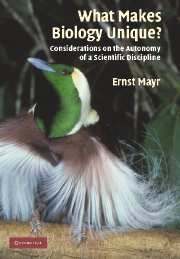Book contents
- Frontmatter
- Contents
- Preface
- Acknowledgments
- Introduction
- 1 Science and sciences
- 2 The autonomy of biology
- 3 Teleology
- 4 Analysis or reductionism?
- 5 Darwin's influence on modern thought
- 6 Darwin's five theories of evolution
- 7 Maturation of Darwinism
- 8 Selection
- 9 Do Thomas Kuhn's scientific revolutions take place?
- 10 Another look at the species problem
- 11 The origin of humans
- 12 Are we alone in this vast universe?
- Glossary
- Index
- References
2 - The autonomy of biology
Published online by Cambridge University Press: 10 December 2009
- Frontmatter
- Contents
- Preface
- Acknowledgments
- Introduction
- 1 Science and sciences
- 2 The autonomy of biology
- 3 Teleology
- 4 Analysis or reductionism?
- 5 Darwin's influence on modern thought
- 6 Darwin's five theories of evolution
- 7 Maturation of Darwinism
- 8 Selection
- 9 Do Thomas Kuhn's scientific revolutions take place?
- 10 Another look at the species problem
- 11 The origin of humans
- 12 Are we alone in this vast universe?
- Glossary
- Index
- References
Summary
It took more than two hundred years and the occurrence of three sets of events before a separate science of the living world – biology – was recognized. As I will show, one can assign these events to three different sets: (A) the refutation of certain erroneous principles, (B) the demonstration that certain basic principles of physics cannot be applied to biology, and (C) the realization of the uniqueness of certain basic principles of biology that are not applicable to the inanimate world. This chapter is devoted to an analysis of these three sets of developments. This has to be done before one can accept the view of an autonomy of biology. For an earlier support of the autonomy of biology see Ayala (1968).
The refutation of certain erroneous basic assumptions
Under this heading, I deal with the support for certain basic ontological principles that later were shown to be erroneous. Biology could not be recognized as a science of the same rank as physics as long as most biologists accepted certain basic explanatory principles not supported by the laws of the physical sciences and eventually found to be invalid. The two major principles here involved are vitalism and a belief in cosmic teleology. As soon as it had been demonstrated that these two principles are invalid and, more broadly, that none of the phenomena of the living world is in conflict with the natural laws of the physicalists, there was no longer any reason for not recognizing biology as a legitimate autonomous science equivalent to physics.
- Type
- Chapter
- Information
- What Makes Biology Unique?Considerations on the Autonomy of a Scientific Discipline, pp. 21 - 38Publisher: Cambridge University PressPrint publication year: 2004
References
- 1
- Cited by



